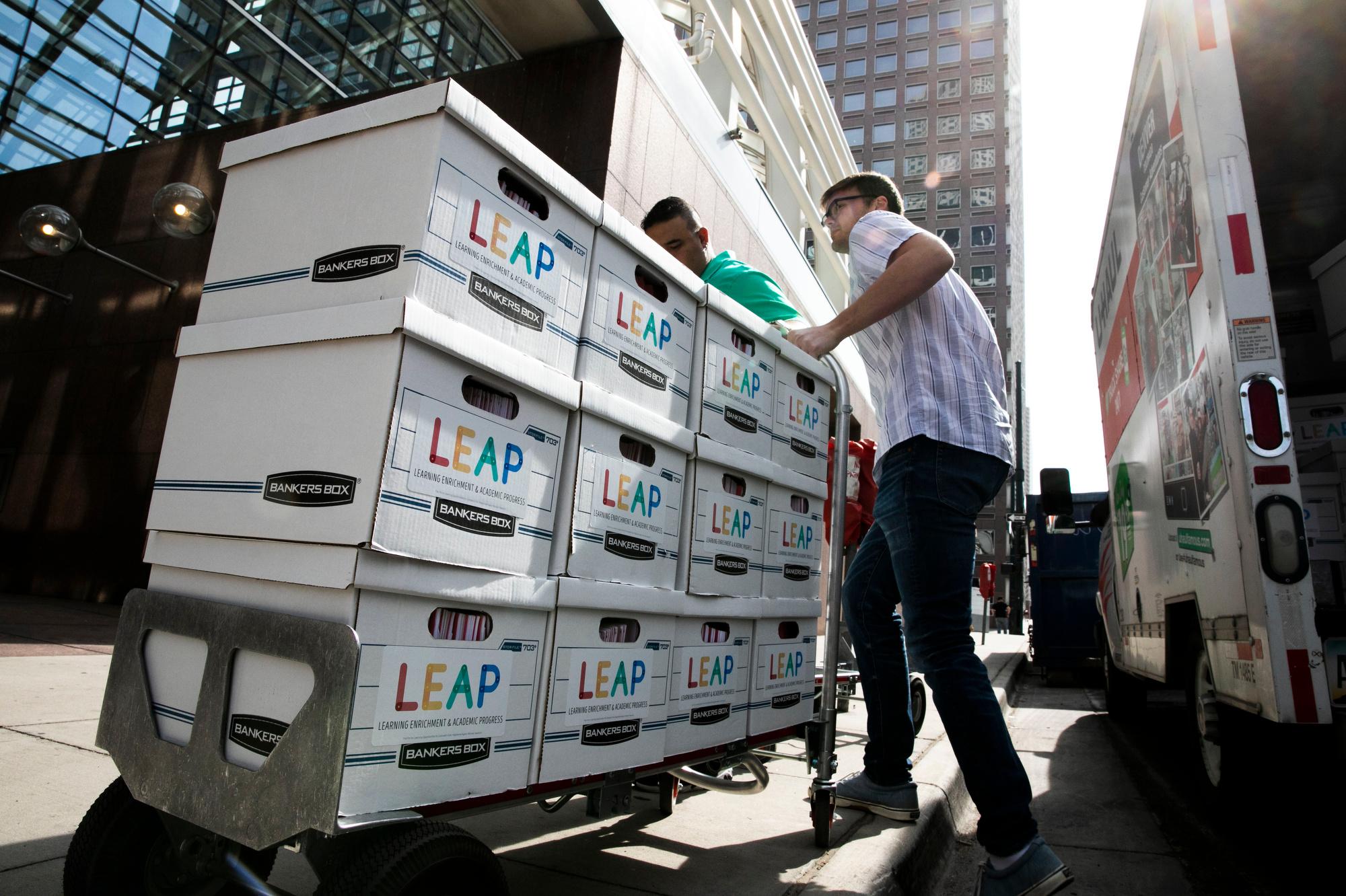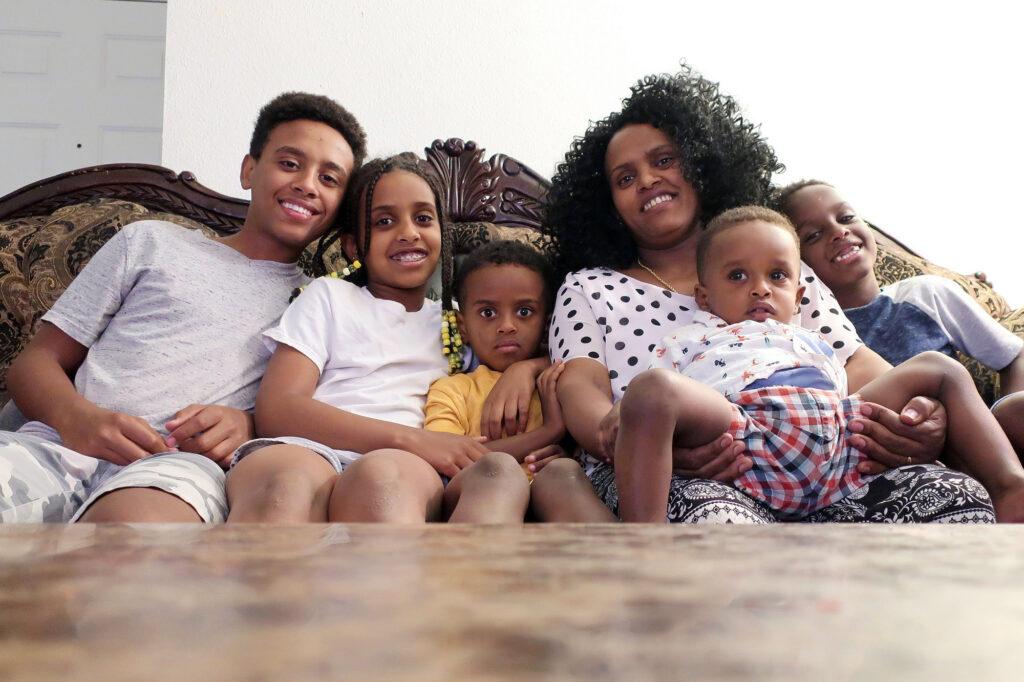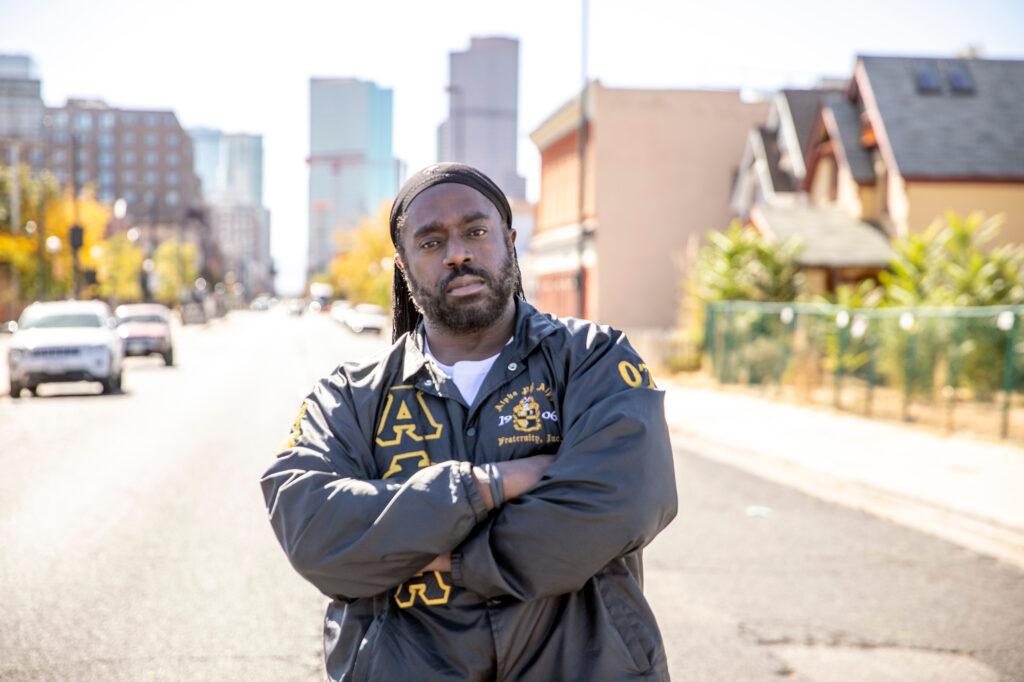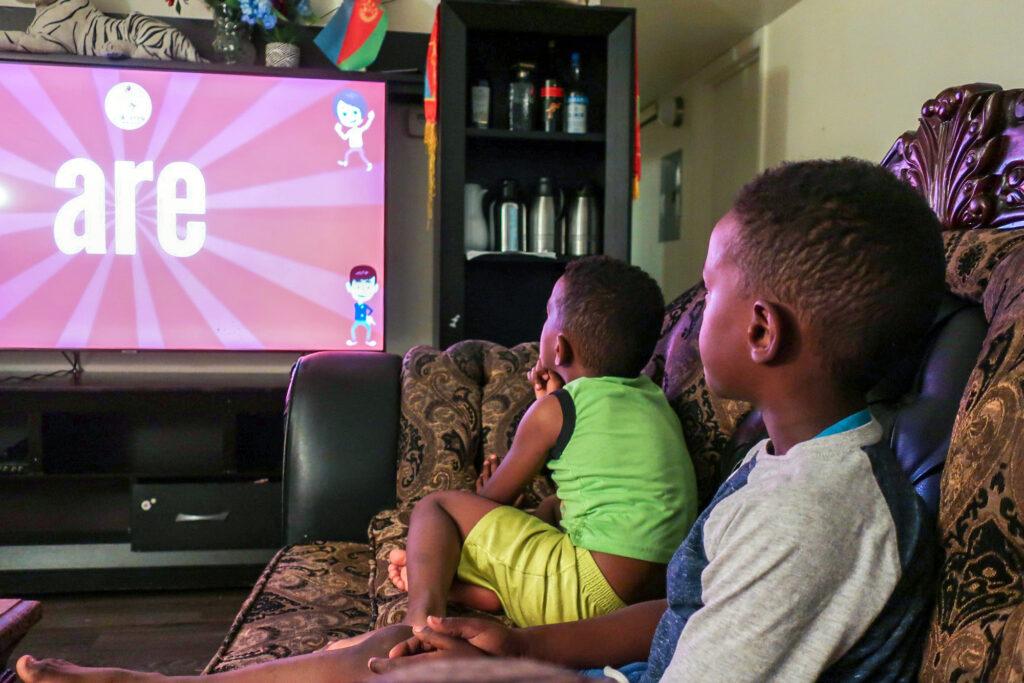
“Why. W-H-Y. Why.” “Asked. A-S-K-E-D. Asked.”
A man on the TV screen slowly reads and spells out one-syllable words. Two small boys, ages 5 and 6, watch the big screen. Their mother, Lemlem Gebregziabiher, said her sons read at a low level at school. So, she flips on instructional YouTube channels hoping they’ll get better.
“I want to help my kids,” said the mother of five. Gebregziabiher, originally from Eritrea and now a U.S. citizen, works the early morning shift at a grocery store. She gets home around 1:30 p.m. and then her husband leaves for his two jobs as a custodian and delivery driver. After rent, utilities, phone and food, there isn’t much left over.
Still, next week, the family will purchase tutoring services for three of their children — $135 a month for two days a week for each child. Tutoring assisted her eldest son, a freshman in high school.
“It’s helped him, after that he’s a very smart boy,” Gebregziabiher said.
It will be a huge sacrifice for the family to pay for tutoring. So, when Gebregziabiher heard about Proposition 119, her face lit up. It’s a state ballot measure that voters will decide on in November that would give low-income families financial aid for out-of-school learning opportunities that wealthier families routinely purchase for their children. Gebregziabiher wants to read more about Proposition 119 before she decides how to vote, but at first glance, she believes it's an opportunity that could change her children’s lives.
“The kid’s future is good if he is a clever student — it is good for the family, it is good for the country,” she said.
Wealthier families often spend a good amount of money on their kids outside of school, from summer camps and soccer programs to coding classes and tutoring. Low-income children like Gebregziabiher’s don’t have that same opportunity.
Proposition 119 aims to give them that opportunity by creating the Learning Enrichment and Academic Progress Program (LEAP). It would credit low-income families with at least $1,500 per year per public school student ages 5 through 17 for out-of-school learning and development programs. To pay for it, Proposition 119 would raise taxes on recreational cannabis and revenues from the state lands trust. Though the measure has bipartisan support, it has sparked opposition from the cannabis industry and among some public education advocates.

Why focus on out-of-school learning opportunities? The roots of the LEAP initiative.
The “opportunity gap” is a big factor driving academic performance gaps in schools. Some of the test score gaps between low-income Colorado students and other students are as high as 30 percentage points and they largely haven’t budged for decades. Many gaps grew bigger during the pandemic.
Research also shows well-designed out-of-school experiences can boost academic achievements, boost work habits and reduce behavior problems, increase disadvantaged student’s cultural capital, improve students’ critical thinking, and increase social tolerance.
A Colorado nonprofit called RESCHOOL has been working on the idea of giving funds to families to choose out-of-school learning opportunities since 2015. Over the years, officials there say they have learned three main things. The first: Learning happens everywhere.
Kids spend about 80 percent of their time outside of school. What they do while not in the classroom helps build academic and social skills that can not only help reverse the negative impacts of COVID-19, but can also help them throughout life.
“They’re out of school a lot more and yet that world outside of school is not equitable,” said RESCHOOL’s executive director Amy Anderson. “Families were saying, ‘We want access to swimming lessons. We want access to tutoring and summer programs for our kids, but we can’t afford them’…. If it's a trade-off between a summer camp versus food, obviously food's going to trump summer camp.”
RESCHOOL’s team also discovered that “learner advocates” can help families navigate and find out-of-school learning experiences. The organization has relied on research about after-school-learning and the longitudinal studies of families by Harvard Professor Robert Putnam to buttress its ideas.
“What he saw was that when kids are blocked off from having enrichment opportunities, it means that they might not graduate high school to the same extent as other kids, they won't develop the same social networks … people who are influencers and mentors that help them later in life,” Anderson said. “And they won't necessarily have the same set of opportunities as kids who've had access to those things.”
A pilot program last summer tried to mimic how LEAP might work. RESCHOOL worked with six community-based partners and distributed $400,000 to the families of 800 young people across Colorado. Low-income families received $500 per child ages 5-17 through learning accounts managed by the ClassWallet platform.
RESCHOOL is preparing a report on how families chose to spend their learning dollars, but in general, sports programs, art supplies, tutoring, STEM classes and robotic kits, books and assistive technology and devices for children with learning or physical disabilities were among the favored programs.
How would Proposition 119 work?
The measure would set up an independent state agency called the Colorado Learning Authority to create a menu of approved out-of-school-learning providers. Families could choose from services including academic tutoring, language learning, career and technical training, mental health or social and emotional services, services for students with special needs, or enrichment programs like arts or sports. That money could also pay for associated transportation, supplies, and materials.
“Families would be able to get to choose the out-of-school learning opportunities that they feel best fit their child,” said Damion LeeNatali, vice-president of policy and strategic philanthropy at the nonprofit Gary Community Ventures, a major backer of Proposition 119.
Public schools would be automatically certified as providers of learning experiences that take place after school and teachers who want to earn a bit of extra money would get priority approval.
Families whose income is at or below the federal poverty level would be prioritized for the money for up to three years; next in line would be students in families with incomes less than twice the poverty level, followed by households with higher incomes. The program would begin awarding financial credits to families in 2023.
Who supports it and who doesn’t?
The measure has high-profile bipartisan support, including a former Republican and Democratic state governor, as well as legislators from both sides of the aisle. But it also has a number of detractors in the education community, including the boards of the Colorado Association of School Boards and Colorado Association of School Executives, the board of the State Land Trust, and the Colorado PTA. The board of the state’s largest teacher’s union, the Colorado Education Association, is taking a neutral stance.
At the same time, a number of organizations that work directly with the education and development of children and youth, such as the Boys and Girls Clubs, Colorado Youth Congress, Firefly Autism, and Servicios de la Raza support the measure.

Opposition from the cannabis industry, others on where the money will come from and how it funds educational activities ?
To pay for it, voters will be asked to approve two funding streams.
One increases recreational cannabis taxes from 15 to 20 percent over the next three years. That is drawing some opposition.
“It is targeting the marijuana industry as a magical bottomless piggy bank — which will devastate the Black and Brown owned cannabis businesses the most,” said Hashim Coates, executive director of Black, Brown and Red Badged – a marijuana trade group for minority-owned cannabis businesses. “Regressive taxes further entrench racial wealth inequalities.”
He said Colorado needs to stop “sin taxing” its way to funding pet projects and instead focus on structural tax reform to properly fund schools.
Joe Megyesy, a member of the Cannabis Community for Fairness and Safety Committee, said cannabis taxes are disproportionately high compared to other industries. He said with taxes approaching 30 percent, “we’re getting dangerously close to not competing against the black market.”
He said many recreational customers use products to treat pain, arthritis, PTSD, and anxiety. He said veterans don’t use medical cards because they are worried about putting their veterans benefits on a medical registry.
“We are also uncomfortable putting a tax on pain relief,” he said.
The measure’s second stream of funding would divert $21 million a year from the State Lands Trust, which oversees millions of acres of public land that generate revenue for public schools. Some of it is used to fund new school buildings and repairs, and some goes to school finance.
That part is drawing opposition from other quarters. Judy Solano, a former state representative and chair of the nonprofit Advocates for Public Education Policy, said Prop 119 takes money out of public education.
Solano said marijuana taxes already help fund some grant-funded programs in schools like literacy and anti-bullying campaigns, as well as dropout prevention programs.
“Why set up a big huge new bureaucratic government agency that operates on its own when any new marijuana taxes raised could go directly into CDE (Colorado Department of Education) to enhance those programs for local schools and districts?”
Supporters say the measure won’t reduce money for school construction or repair grants that come through the state land trust. But, a nonpartisan legislative analysis of Prop 119 said the measure, however, could reduce the amount of interest earnings that would otherwise be available for school finance and other K-12 uses.
Solano and others ask why backers of Prop 119 aren’t concentrating on properly funding Colorado’s schools instead of pushing a tax increase using cannabis.
“That’s the question,” she said. “Money does matter. It matters to schools if they have a four- or five-day work week. It matters to schools if their classrooms have schools less than 35 (students), it matters if a school can have a school counselor and a school nurse.”
Backers of Proposition 119 agree public schools need more money. But bringing Colorado up to even the national average in per pupil spending would take billions of dollars.
“You’re not going to get that from the marijuana industry, you’re not going to get that from tobacco or alcohol,” said Gary Community Ventures’ Damion LeeNatali. “That really could only come by way of a statewide property tax or a statewide income tax.”
Colorado voters have weighed in on statewide ballot measures to raise income taxes for schools at least three times and each time they’ve resoundingly said “no.”

What sort of oversight will the new agency have?
The new state agency, the Colorado Learning Authority, would oversee the LEAP program and contract with out-of-school learning providers. A nine-member board appointed by the governor would oversee the agency. It would have the sole authority to make decisions about which providers it contracts with and would work independently from the Colorado Department of Education. In 2024, the measure gives the agency more flexibility in setting how much financial awards families get and how the money is distributed.
For people like Tim Kubik, chair of the Colorado Democratic Party’s Education Initiative, that’s not enough. He said there’s little accountability and set goals at the outset if Prop 119 passes.
“It really opens a question about whether the money can accomplish what it really sets out to accomplish,” he said. Opponents of the ballot question say education money should be controlled at the county and school district levels.
Prop 119 backers say that unlike any other state agency, the state agency will be subject to an annual audit from an independent financial agency. It will be subject to oversight by the state auditor and the general assembly, and the programs will be rated by families. The measure calls for creating an evaluation system on learning impacts by 2024.
“There’s no school in the state that can get away with that,” Kubik said. “Every single school we have has to be accountable to (state) Department of Education metrics from day one.”
Backers of Prop 119 said schools are always held responsible for solving the “achievement gap” — measured by metrics and test scores — a phenomenon that has roots in societal inequities. They say it is time for an out-of-the-box idea that would place some control with parents for meeting their child’s needs.
“Parents know their children best and make the best decisions for their children,” said Brenda Dickhoner, with the conservative education advocacy group Ready Colorado. She said the money will not only help children with their academics, but can be used for activities like sports and music, which build other skills.
“They learn about leadership and collaboration, creative thinking … all of these traits that are very important to employers.”
Lemlem Gebregziabiher’s family has some ideas about where they’d like to put the money, should the measure pass.
Silvana, 10, would love to do gymnastics. Her brother would like to improve his basketball skills.
“My mom could use the extra cash for tutoring, for lessons we wish we could go to but couldn’t because we couldn’t spend that monthly – like activities, like soccer, karate, boxing,” the 14-year-old Sinados said.
Lemlem Gebregziabiher said her top priority would be tutoring, exercise, computer skills, and swimming lessons — and behavioral help if needed as her kids get into their adolescent years.









